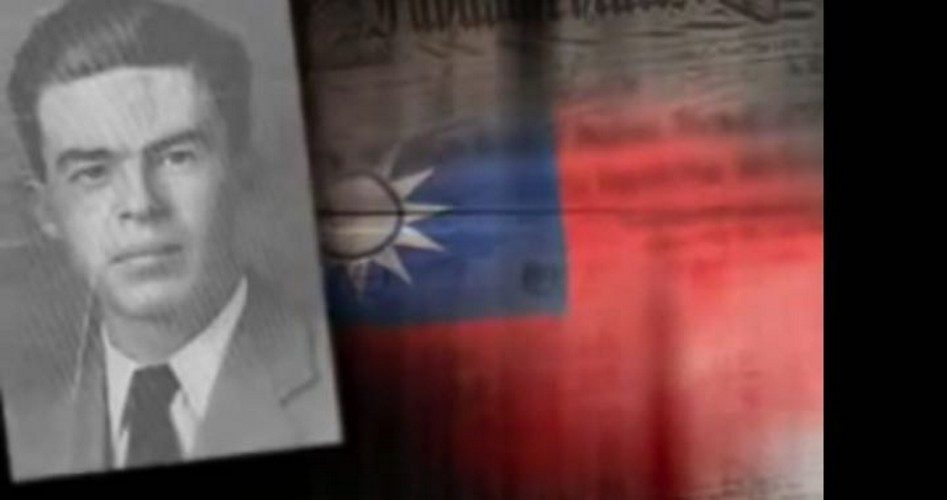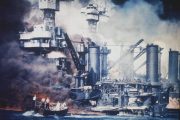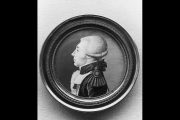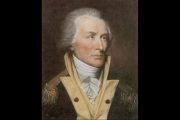
Both John Birch and the society that bears his name wanted less government, more responsibility, and with God’s help, a better world.
In 1962, the pop group known as the Chad Mitchell Trio released a song poking fun at the anti-Communist John Birch Society (parent organization of The New American), in which the singers pose as “goofy” JBS members. In the song, they proclaim, “We only hail our hero from whom we got our name. We’re not sure what he did, but he’s our hero just the same!”
The light-hearted song was actually very popular with Birchers, even being performed at the society’s youth camps in the 1970s, but it raises a very good question.
So what did John Morrison Birch actually do, to be honored by having his name used for an organization dedicated to the concept of “less government, more responsibility, and with God’s help, a better world?”
His early life certainly gave no indication that his name would be associated with a society dedicated to educating Americans in the philosophy of limited government. His parents were poor missionaries, and Birch was born in India on May 28, 1918. They soon returned to the United States, however, and Birch’s early years were spent mostly in Georgia, where he graduated from Mercer College (a Baptist institution).
While sometimes referred to as a “Southern Baptist,” he was actually what is called a “Bible Baptist,” and he enrolled in the Bible Baptist Seminary at Fort Worth, Texas, completing its two-year curriculum in just a year. He was anxious to serve his God as a missionary to China, where he went in 1940. He immersed himself in Mandarin Chinese, and began the work of converting the Chinese to Christ.
But the bombing of Pearl Harbor on December 7, 1941 changed young Birch’s life, and ultimately led to his death. China and Japan had already been fighting for several years, and now Birch’s own country of America was in the fight. In April 1942, Colonel Jimmy Doolittle led a daring bombing raid on Tokyo. Because his fliers did not have enough fuel to return to American bases in the Pacific, they were forced to fly into China, hopefully to get past Japanese-controlled regions.
Some did not make it, but Colonel Doolittle and his crew bailed out in China. There, they were assisted by friendly Chinese. Fortunately for Doolittle, Birch was doing missionary work near the Lan River, and found Doolittle and several others, hiding in a boat. Birch saved them from advancing Japanese troops, and this led to Birch’s direct involvement in the war effort.
Birch reasoned that his missionary efforts to the Chinese would be futile unless the Japanese invaders were expelled, so he tried to enlist in the military as a chaplain. But because of his knowledge of the Chinese language, he was used as a translator for Doolittle, and later became an intelligence officer for General Claire Chennault (of the famous “Flying Tigers”), supplying him with information vital to the American war effort.
Writing in 20th Century Heroes, Steve Bonta noted,
But Birch’s contribution to the war effort in China went beyond the collection of accurate and reliable intelligence. The brave young missionary also set up a network for rescuing American fliers shot down behind enemy lines. About 90 percent of Chennault’s downed fliers were rescued by Birch’s system.
Chennault noted that this success rate was “the highest percentage of any war theater.” He added, “I cannot praise his work sufficiently.”
Chennault was not the only American officer to praise young Birch. Lt. Arthur Hopkins recalled of Birch: “Without reservation, I will say that he was the most brilliant, finest, most able, bravest officer I ever met.”
Birch’s abilities in the intelligence field were so great that he was offered a position in the war-time intelligence arm of the U.S. government, the Office of Strategic Services, the forerunner of the Central Intelligence Agency. But Birch had no desire to work for the OSS, so it was arranged that he would serve as “officially on loan” to the agency, as opposed to being formally transferred. He intended to return to spreading the gospel of Christ to the Chinese as soon as the war ended.
In his essay “The War Weary Farmer,” written in April of 1945, Birch said, “I want to reach the sunset of my life sound in body and mind, flanked by strong sons and grandsons, enjoying the friendship and respect of neighbors, surrounded by fertile fields and sleek cattle, and retaining my boyhood faith in Him who promised a life to come.”
But it was not to be. The war ended in mid-August of 1945, but Birch would only survive its end until August 25. Captain Birch and a small group of American and Chinese soldiers were traveling to Hsuschow by railroad handcar, when they encountered a hostile brand of communists. While Lt. Tung of the Nationalist (anti-communist) Chinese army attempted to negotiate with the Communist Chinese, he was unsuccessful, and Birch was murdered — making him the first American casualty of the developing Cold War between America and America’s allies and the Soviet Union and its allies, such as the communist Chinese.
Americans, however, would not know of this murder of John Birch until several years later, as pro-communists inside the U.S. government classified its documentation. A letter from Major General Edward Witsell to Birch’s mother said only that he was killed “as the result of stray bullets fired by communist forces.” But General Albert Wedemeyer had already — only five days after the murder — confronted Mao Tse-tung about the incident. Mao promised to punish the guilty parties (though it is extremely unlikely that this ever happened).
Then, on September 5, 1950, Senator William Knowland, a Republican from California, took to the Senate floor to denounce the coverup, blaming pro-communists inside the U.S. government. Robert Welch, a strongly anti-communist candy manufacturer (Sugar Daddies, Sugar Babies, and Junior Mints), after reading with indignation about Birch’s murder and its subsequent coverup by the U.S. government, proclaimed Birch the first American casualty of the Cold War.
He soon wrote the book The Life of John Birch, and later named his anti-communist organization — The John Birch Society — in his honor. While some have argued that Birch would not have approved of this use of his name, the evidence is that he would have been deeply honored. A review of his life, the anti-collectivist philosophy expressed in his short essay “The War Weary Farmer,” and the fact that his parents not only approved, but became life members of the JBS, would indicate that Birch would have been enthusiastic about not only the name, but the goals of the society.
Birch’s views seem to match perfectly with the society that bears his name. In the anti-collectivist essay “The War Weary Farmer,” Birch wrote, “I want of government only protection against the violence and injustices of evil or selfish men.” The motto of the JBS is similar: “Less Government, More Responsibility, and With God’s Help, a Better World.”
In a letter Birch wrote to an aunt in 1942, he certainly had concerns about the collectivist and globalist direction in which the world was headed. He told her that “the world stage” was being set for “the rise of the anti-Christ.” It is almost certain that Birch would have heartily endorsed the program of the John Birch Society, which has fought against “the federations” of the evil world system he denounced in 1942. While Birch’s life was summarily ended through a virtual execution by communists in 1945, he no doubt is presently enjoying the fruits of what he anticipated in “The War Weary Farmer,” of reaching the end of his earthly life, “retaining [his] boyhood faith in Him who promised a life to come.”
John Birch’s earthly remains lie somewhere in an unmarked grave in China, but he is no doubt with his Lord today. And the society that bears his name carries on the goals of his earthly life, fighting for a government limited to “only protection against the violence and injustices of evil or selfish men.” Those readers who wish to join Birch in fighting for such a “better world” can do so by joining The John Birch Society.
Image of John Birch: Screenshot of a Youtube video Who Is John Birch
Steve Byas is the author of History’s Greatest Libels, a defense of historical figures such as George Washington, Thomas Jefferson, Marie Antoinette, Christopher Columbus, and Joseph McCarthy.




